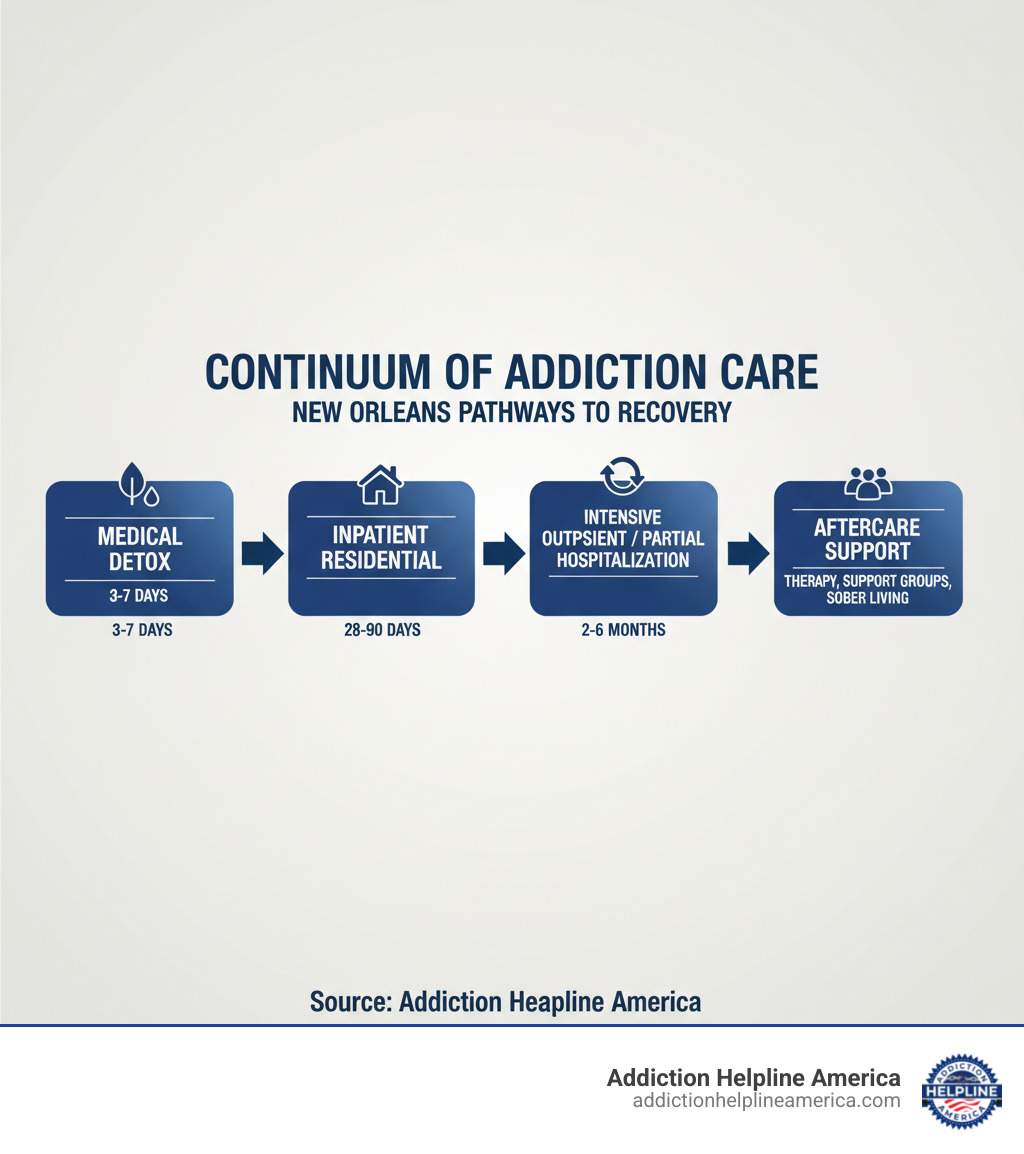
Finding Hope: Your Guide to Addiction Treatment in New Orleans
Rehab facilities in New Orleans offer a range of treatment options to help individuals overcome addiction. Whether you need medical detox, inpatient care, or outpatient therapy, the city provides comprehensive services to meet your needs.
Quick Overview of New Orleans Rehab Options:
| Treatment Type | What It Offers | Typical Duration | Cost Range |
|---|---|---|---|
| Medical Detox | Medically-supervised withdrawal management | 3-7 days | Part of inpatient cost |
| Inpatient/Residential | 24/7 care in a structured environment | 28-90+ days | $5,000-$50,000 |
| Intensive Outpatient (IOP) | Flexible treatment while living at home | 3-6 months | $1,000-$10,000 |
| Partial Hospitalization (PHP) | Day programs with intensive support | 2-4 weeks | $350-$450/day |
| State-Funded Programs | Free or low-cost treatment based on income | Varies | $0-sliding scale |
Finding the right treatment can feel overwhelming. You may wonder where to start, what to expect, or how you’ll afford care. The good news is that New Orleans has a variety of rehab facilities offering everything from detox to long-term programs, and many accept insurance or offer low-cost options.
This guide breaks down what you need to know about addiction treatment in New Orleans, from the different levels of care to costs, payment options, and aftercare support. At Addiction Helpline America, we provide confidential support and personalized treatment referrals 24/7. Our team understands the path to recovery starts with finding the right help—and we’re here to guide you.
Find more about rehab facilities in new orleans:
Understanding the Landscape of Addiction Treatment in New Orleans
When you’re searching for rehab facilities in New Orleans, it helps to understand the spectrum of care available. The right program depends on the severity of your addiction, your mental health, and your daily life circumstances. New Orleans offers every level of care, from emergency detox to long-term outpatient support, ensuring you have a smooth transition through the continuum of care.
Medical Detox: The First Safe Step
If your body is physically dependent on drugs or alcohol, detox is where recovery begins. Withdrawal from substances like alcohol or benzodiazepines can be dangerous, with risks of seizures or delirium tremens. Opioid withdrawal is painful and often leads to relapse. Medically-supervised detox is essential for safety and comfort. In a professional detox program, medical staff monitor your vital signs and provide medication to ease symptoms. If you’ve ever felt sick when trying to quit, please do not attempt to detox alone.
Inpatient vs. Outpatient Programs: What’s the Difference?
After detox, the main phase of treatment begins. Inpatient residential care means you live at the treatment center 24/7, fully immersed in a structured, substance-free environment. This level of care is best for severe addiction or if your home environment is not supportive. You’ll attend therapy, participate in groups, and learn about addiction. Program lengths vary, with short-term options around 28-30 days and long-term programs lasting 60, 90 days, or more. Research shows that longer treatment often leads to better outcomes.
Outpatient programs allow you to live at home while attending treatment. This works well if you have a stable home and responsibilities like work or childcare. There are different levels of intensity:
- Partial Hospitalization Programs (PHPs) are the most intensive, running five days a week for several hours, similar to a full-time job.
- Intensive Outpatient Programs (IOPs) are more flexible, typically involving 9-12 hours of treatment per week.
Many rehab facilities in New Orleans offer these flexible outpatient options, which usually last three to six months. The key to long-term success is aftercare planning. The best facilities create a plan for what comes next, such as ongoing therapy, support groups, or sober living, to help you stay sober for years to come.
Navigating the Cost of Rehab in New Orleans
One of the first questions people ask is, “How much will this cost?” Quality addiction treatment is an investment in your future, and there are more payment options available than most people realize. Whether you have comprehensive insurance or none at all, there are pathways to getting help at rehab facilities in New Orleans.
What Factors Influence the Cost?
The price of treatment depends on several factors:
- Level of Care: Inpatient programs cost more than outpatient because they include housing, meals, and 24/7 supervision. Inpatient rehab can range from $5,000 to $50,000, while outpatient programs generally run between $1,000 and $10,000.
- Program Length: A 28-day stay will cost less than a 90-day program, though longer programs often yield better results for severe addiction.
- Amenities: Luxury facilities with private rooms and spa-like services have a higher price tag than standard facilities that provide excellent, evidence-based care without the frills.
- Clinical Care: Programs with specialized medical supervision or dual diagnosis treatment may cost more due to the required expertise.
Using Insurance to Pay for Treatment
Most health insurance plans are required to cover addiction treatment under the Mental Health Parity and Addiction Equity Act. Many rehab facilities in New Orleans accept a wide variety of private insurance plans (like Blue Cross Blue Shield, Aetna, Cigna) and public options like Medicaid and Medicare. Before committing to a facility, it’s crucial to verify your benefits. An admissions team can help you understand your deductible, out-of-pocket maximum, and what your plan covers.
Finding Affordable Rehab Facilities in New Orleans
If you don’t have insurance, you still have options. We believe everyone deserves a chance at recovery, regardless of their financial situation.
- State and federal funding supports many addiction treatment services, often providing free or low-cost care based on a sliding scale for those with limited income.
- Non-profit organizations offer valuable resources, sometimes providing long-term residential treatment at no cost, funded through other means.
- Sliding-scale fees are offered by many facilities, adjusting the cost based on your ability to pay.
- Grants and scholarships may be available through non-profits or individual centers.
Our team at Addiction Helpline America specializes in helping people steer these financial questions. We can connect you with rehab facilities in New Orleans that fit your financial situation. Don’t let cost be the reason you don’t seek help.
How to Choose from the Best Rehab Facilities in New Orleans
Choosing where to seek treatment is a critical decision. It’s about finding a place that aligns with your specific needs, goals, and values. The facility that’s perfect for someone else might not be the right fit for you, and that’s okay.
Key Qualities of a Top-Tier Facility
When evaluating rehab facilities in New Orleans, look for these markers of quality:
- Accreditation: Look for accreditation from organizations like CARF or The Joint Commission. This signifies that a facility meets strict standards for patient care and safety.
- Evidence-Based Therapies: The best facilities use scientifically-backed approaches like Cognitive Behavioral Therapy (CBT), Dialectical Behavior Therapy (DBT), and Medication-Assisted Treatment (MAT).
- Licensed and Certified Staff: Quality centers employ multidisciplinary teams of physicians, nurses, licensed therapists, and certified addiction specialists.
- Individualized Treatment Plans: A reputable facility will conduct a thorough assessment and create a treatment plan custom to your unique history and goals.
- Continuum of Care: Look for a facility that provides seamless transitions from detox to inpatient, outpatient, and aftercare support.
The Admissions Process: What to Expect
The admissions process is designed to be as straightforward as possible.
- Initial Phone Call: This is your chance to ask questions and get a feel for the facility. Our team at Addiction Helpline America can facilitate this call.
- Pre-Admission Assessment: A comprehensive evaluation (over the phone or in person) helps determine the right level of care for you.
- Insurance Verification: The admissions team will work with your provider to clarify coverage and any out-of-pocket costs.
- Intake: Upon arrival, you’ll complete paperwork and get oriented. Your privacy is protected by HIPAA laws.
Generally, you should pack comfortable clothing, basic toiletries (alcohol-free), your ID, and insurance information. Most facilities restrict electronics to help you focus on recovery.
Finding Specialized Rehab Facilities in New Orleans
New Orleans offers a diverse range of specialized programs because one size doesn’t fit all.
- Dual Diagnosis Treatment: About 50% of people with substance use disorders also have a co-occurring mental health disorder like depression or anxiety. Specialized programs treat both conditions simultaneously, which is critical for lasting recovery.
- Gender-Specific Programs: Men’s and women’s programs create environments where participants can feel more comfortable addressing sensitive issues related to societal pressures and trauma.
- LGBTQ+ Affirming Care: These programs provide a safe, respectful environment that understands the unique challenges and discrimination LGBTQ+ individuals may face.
- Veterans Programs: Dedicated services are available that understand the specific needs of veterans, including combat trauma and PTSD.
- Executive Rehab: These programs serve professionals who need treatment with discretion and flexibility, often allowing for limited, monitored connectivity to manage critical business matters.
At Addiction Helpline America, we can connect you with rehab facilities in New Orleans that match your specific needs.
Life After Treatment: Recovery Support in New Orleans
Finishing a rehab program is an incredible accomplishment, but it’s just the beginning. Long-term recovery requires ongoing support and a network of people who understand your journey. New Orleans has a vibrant recovery community ready to welcome you and help you thrive.
Ongoing Therapy and Counseling
Staying connected to therapy is a powerful tool for maintaining sobriety. It provides a safe place to process challenges and build on the skills you learned in rehab.
- Individual therapy offers one-on-one support custom to your personal issues.
- Group counseling connects you with peers, reminding you that you’re not alone.
- Family therapy helps heal relationships and teaches your loved ones how to support your recovery.
- Trauma-informed care offers a gentle approach for those who have experienced trauma, which is common among people with substance use disorders.
Peer Support Groups and Sober Living
New Orleans has a rich network of peer support groups that provide fellowship and accountability.
- 12-Step fellowships like Alcoholics Anonymous (AA) and Narcotics Anonymous (NA) are available throughout the city. You can find AA meetings here and NA meetings here.
- Alternative groups like SMART Recovery offer a different, self-empowerment-based path. Find SMART Recovery meetings here.
- Family support groups like Al-Anon and Nar-Anon provide help for your loved ones. You can find Al-Anon meetings here and Nar-Anon meetings here.
- Other specialized groups include Dual Recovery Anonymous (DRA), Cocaine Anonymous (CA), and Crystal Meth Anonymous (CMA). You can find meetings for DRA here, CA here, and CMA here.
Sober living homes offer a structured, substance-free environment to transition back into daily life. They provide peer support and accountability while you work or attend school. Many rehab facilities in New Orleans offer recovery residences as part of their continuum of care.
Alumni programs from treatment centers keep you connected to the community you built during rehab through events and ongoing support.
Comprehensive Rehabilitation Services
Your overall health is crucial for a strong recovery. Sometimes, substance use is accompanied by physical or cognitive challenges that also need attention. New Orleans has specialized rehabilitation services that take a holistic approach to well-being, offering programs for conditions that may co-exist with or result from addiction, such as brain injuries or other chronic health issues. Addressing your physical and cognitive health strengthens your overall recovery journey.
Frequently Asked Questions about New Orleans Rehab
Considering treatment brings up many questions. At Addiction Helpline America, we hear these concerns every day. Here are answers to some of the most common questions about rehab facilities in New Orleans.
Will I lose my job if I go to rehab?
This is a common fear, but in most cases, your job is protected. The Americans with Disabilities Act (ADA) recognizes addiction as a disability, meaning an employer cannot fire you for seeking treatment. Additionally, the Family and Medical Leave Act (FMLA) allows eligible employees to take up to 12 weeks of unpaid, job-protected leave for medical reasons, including addiction treatment. Your medical information is also protected by strict HIPAA confidentiality laws. Don’t let fear about your job prevent you from getting the care you need.
How much does rehab in New Orleans cost?
The cost of rehab facilities in New Orleans varies significantly based on the type and length of care.
- Inpatient residential programs can range from $5,000 to $50,000.
- Outpatient programs are more affordable, typically ranging from $1,000 to $10,000.
- Partial Hospitalization Programs (PHP) are more intensive and can cost around $350-$450 per day.
Factors like program length, amenities, and level of clinical care affect the final price. However, these numbers shouldn’t discourage you. Health insurance (including Medicaid/Medicare), state funding, non-profit programs, grants, and sliding-scale fees can dramatically reduce your out-of-pocket costs. Some non-profit centers even offer free long-term treatment for eligible individuals. We can help you find affordable care that fits your situation.
What should I bring with me to rehab?
Each facility has its own guidelines, but here is a general list of what to pack and what to leave at home.
What to Bring:
- Photo ID and insurance card.
- A small amount of cash for incidentals.
- Comfortable, casual clothing for 7-10 days.
- Alcohol-free toiletries in non-aerosol, non-glass containers.
- A list of important phone numbers.
What to Leave at Home:
- Illicit substances, alcohol, or products containing alcohol.
- Weapons or sharp objects.
- Cell phones, laptops, and other electronics (most facilities restrict these to minimize distractions).
- Expensive jewelry or excessive cash.
Always contact your specific rehab facility for their detailed packing list before you go. We can help you get this information when we connect you with a treatment center.
Your Path to Recovery Starts Today
If you’ve read this guide, you’ve already taken an important step—seeking information and considering change. We know that navigating rehab facilities in New Orleans can feel overwhelming, but you don’t have to do it alone.
New Orleans offers a full spectrum of care, from detox to aftercare, with options to fit every need and budget. Recovery is possible, and it’s happening every day for people who once felt exactly as you might feel now.
At Addiction Helpline America, we offer free, confidential guidance 24/7. Our team takes the time to understand your unique situation and connect you with a program that truly fits. Your path to recovery doesn’t have to start with perfect circumstances—it starts with a single decision to reach out for help.
Find personalized alcohol and drug addiction treatment in New Orleans, Louisiana. Your new life is waiting. Let us help you take that first step today.
Our helpline is 100%
free & confidential
If you or someone you care about is struggling with drug or alcohol addiction, we can help you explore your recovery options. Don’t face this challenge alone—seek support from us.
Programs
Resources
Will my insurance
cover addiction
treatment?
We're ready to help
Find the best
drug or alcohol treatment
center
Are you or a loved one struggling with addiction? Call today to speak to a treatment expert.
















